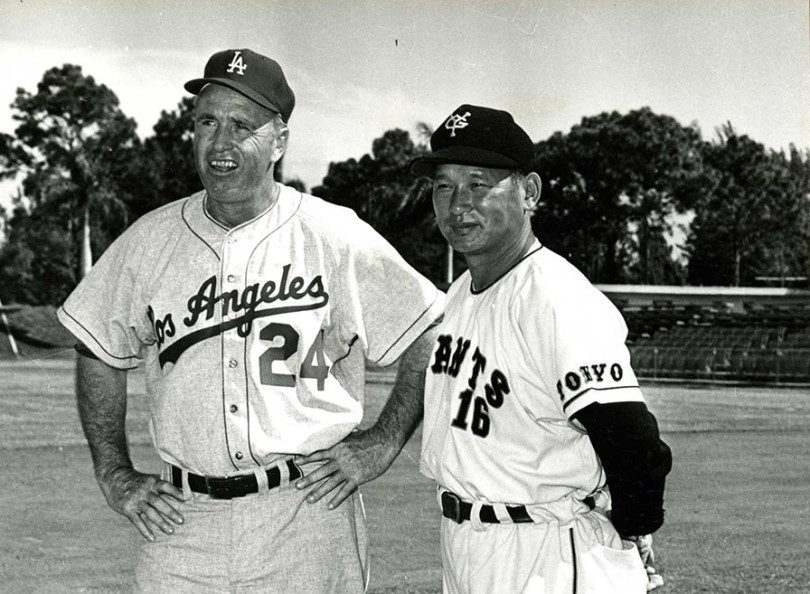
(L-R) Dodger Manager Walter Alston; Tokyo Yomiuri Giants Manager Tetsuharu Kawakami. Alston won four World Championships for the Dodgers and was elected to the Baseball Hall of Fame in 1983. Kawakami managed the Giants to nine consecutive Japan Series championships and was inducted into the Japan Baseball Hall of Fame in 1965.
Biography
Tetsuharu Kawakami
Tetsuharu Kawakami was the Tokyo Yomiuri Giants Manager from 1961-1974, following his 18-year playing career as a left-handed hitting and fielding first baseman, where he was a member of 4 Japan Series winners. Kawakami was on teams that won 8 more Japanese Professional Baseball League titles, prior to the inauguration of the Japan Series in 1950. He was inducted into the Japan Baseball Hall of Fame in 1965 and known as the “God of Hitting”. Kawakami led the 1961 Giants to train at Dodgertown, Vero Beach, Florida and he started his friendship with Peter O’Malley who was responsible for the Giants’ schedule and all arrangements from their arrival to departure. The Giants, under Kawakami’s leadership, won 11 Japan Series championships, including 9 consecutive titles from 1965-1973. In 1966, when the Dodgers traveled to Japan for their second Goodwill Tour, Kawakami in appreciation presented Peter with a Katana (Japanese longsword) that was made in the 1600s. Kawakami’s Giants defeated the Dodgers four of the seven games in Japan.
In presenting the Katana, Kawakami also gave Peter powder, reminding him to apply and rub it on the sword every day! The sword is from the mid-Edo period (1650-1784) and based on a design by a legendary blacksmith Kuninaga (1329-1346). The blade, 72.7 cm in length, is a representative example of work from the Mino Seki School. These swords exhibit a flowing wood-grain pattern with a whitish sheen to the steel. The hamon, or tempered edge, is made up of ko nie (martensite) executed in an undulating pattern, and is as sharp as any razor. Made in the 1600s, the tang was shortened slightly sometime after its creation, yet a signature remains bearing the two characters of its maker, Kuninaga. The blade was presented with its mount from the 1800s. As blades were often handed down from generation to generation in samurai families, it was not uncommon to have them remounted to reflect each new owner’s personal taste.
In July, 2001, Peter and Hall of Fame Dodger Manager Tommy Lasorda spent time with Kawakami and Tokyo Yomiuri Giants Manager Shigeo Nagashima in Tokyo. In 1937, Kawakami’s high school team (Kumamoto Tech) played in the Koshien tournament and lost in the championship game. He took a handful of dirt and put it in his uniform pocket to savor the memory. That started the tradition of high school players scooping “the dirt of Koshien” as a memento of their time, however brief, on the hallowed Koshien Stadium field. Kawakami, whose number 16 is retired by the Tokyo Yomiuri Giants, passed on October 28, 2013 at the age of 93.

